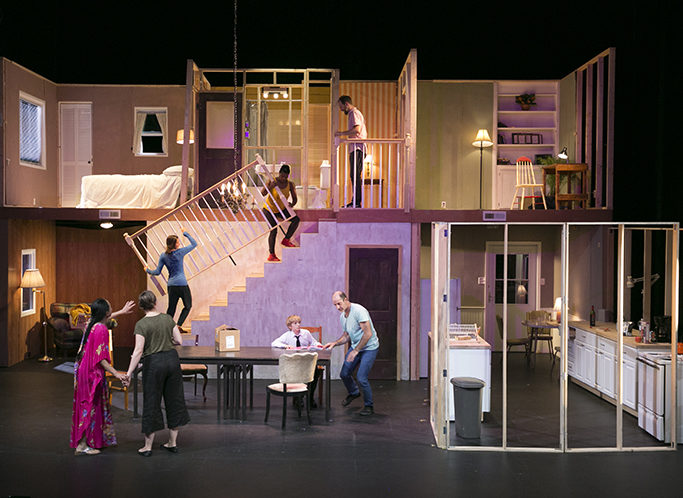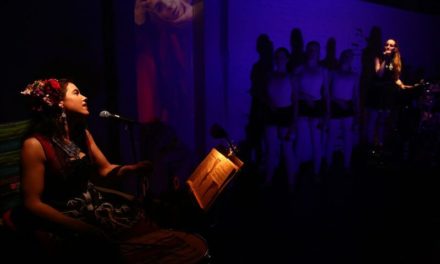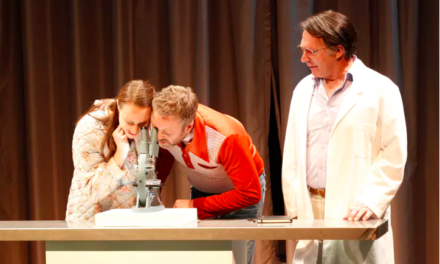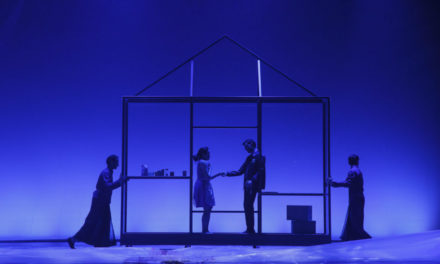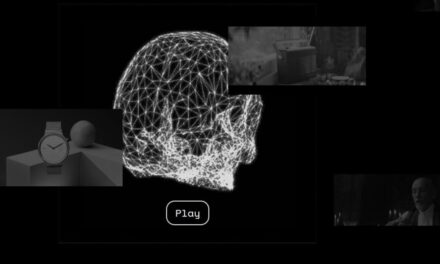In Home, Geoff Sobelle and company, under the skillful direction of Lee Sunday Evans, create a spectacle of growth and multiplication, shift and change that challenge perceived ideas of ownership, community, and hospitality. The show starts small, with a man (played by Sobelle) trying to build a house out of wooden frames, but expands soon enough through the stage illusions of illusion designer Steve Cuiffo. Appearing out of thin air, a bed and a door are the first fragments of an individual’s memory of home and family to the surface, which the company uses for vanishing acts. The escalation in scale reaches a jaw-dropping level when an actual frame house (scenic design by Steven Dufala) appears onstage, and, as the performers furnish the house with meticulous detail and engage in everyday rituals, we witness a sped-up process of how humans inhabit a house, breathe life into it, and gradually transform it into a home.
Similar to Sobelle’s earlier performance piece The Object Lesson, which probed the human-object relationship, Home asks basic, universal questions about our relationship to the spaces we dwell in. How does a house become a home? What does it mean to have—or not to have—a home? What is our relationship to those who have lived in our homes before us, and to those who will come after? Trying to answer these questions is a balancing act between what Sobelle describes in a Vaudevisuals interview as exploring simple, human, relatable themes and maintaining a level of specificity that enables the audience to put themselves into the work in various ways. To avoid limiting the narration to one particular family living in a single time, Home has its performers embody multiple characters who have lived in a house at different times with deliberate ambiguity and cunning fluidity. Any initial attempts to deduce the performers’ roles or establish fixed familial relationships between them are bound to become a wild goose chase. What emerges is a cycle of recognizable and representative daily occurrences, running its ceaseless course over months, years, and eventually time immemorial. Recalling Thornton Wilder’s Our Town or The Long Christmas Dinner, shavings of life encapsulate the passage of time in actions as mundane as carrying laundry down the stairs, or as momentous as coming home after a funeral. Rendered through lithe, nimble, precisely choreographed movement (thanks to choreographer David Neumann and director Evans’ dance background) influenced by mime and clown elements (Sobelle had trained at the Lecoq School in Paris), these wordless moments crystallize both the comedy and sublimity of the everyday.
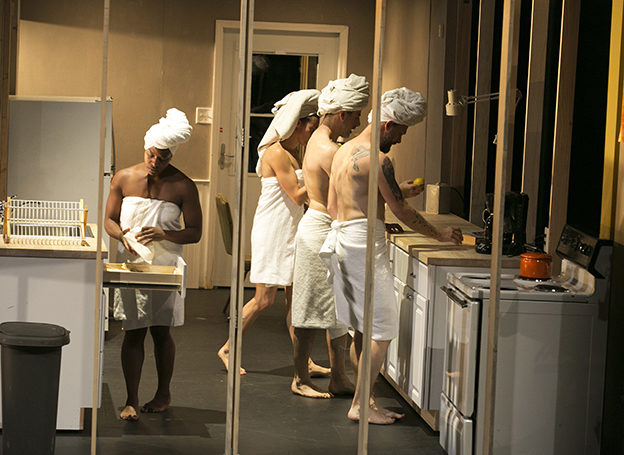
Home (2017), by Geoff Sobelle, directed by Lee Sunday Evans, ArtsEmerson, Boston. Photo: Evgenia Eliseeva.
If the playful, evocative approach to the everyday routine in the first half of Home is remarkable, then the second half, with its cleverly inclusive and spectacularly executed large-scale audience interaction, is revelatory. Members of the audience, led onstage as guests at a house party, are absorbed into the group of performers with astonishing efficiency and assigned to welcome and instruct the next arrivals. Eventually, thirty-odd audience members in addition to the original cast of seven populate the stage, part of a whirlwind party that becomes peppered with representations of life events from cradle to grave, segueing into each other with an uninterrupted flow. Roles and situations shift in the blink of an eye, creating humor and tension, obligating participants onstage to grapple with constant changes as they take part in endless performances within one gigantic performance. A veil draped on an audience member’s head launches an impromptu wedding; out of a gift box pops a crying bundle, transforming two strangers into new parents; joviality suddenly switches gears to soberness, as everyone gathers for a wake and a funeral procession.
In asking its audience to participate in such a volatile, elaborate, and involved process on such a colossal scale, Home actively encourages its audience to rethink the definition of welcome, acceptance, inclusivity, and hospitality. The mad, manic state of flux and migration onstage blurs and questions the boundaries between performer and spectator, but also those between owner and guest, as we see a new arrival onstage become a host in a split second, taking ownership of the stage to welcome yet another new guest. If our ownership of property and life is so temporary to begin with, Home asks, to what extent can we claim to be owners of anything? Rather than viewing strangers as an alien and foreign other, Home breaks down the barriers between host and guest, demonstrates the constructed nature of these categories, and in doing so reminds us of the utopian ideal of unconditional hospitality. Sobelle, in his Vaudevisuals interview, also suggests that inhabitants of a house at different times of its history leave “traces” for each other. When viewed on a longer timescale, home as a concept goes beyond being a spatial entity or a private familial circle, becoming a site of belonging and familiarity where a community can gather and form, and it erects no hard fence but revels in its potential to welcome all.
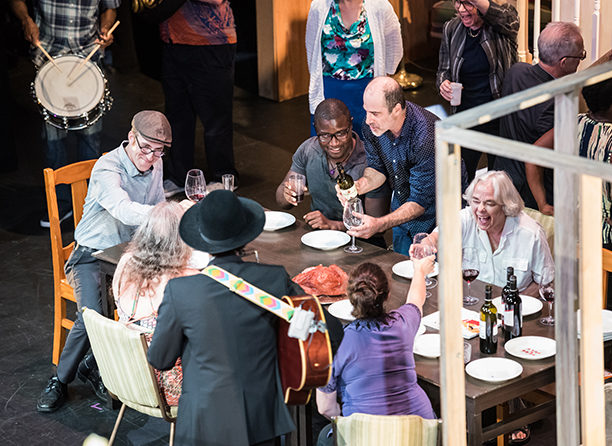
Home (2017), by Geoff Sobelle, directed by Lee Sunday Evans, ArtsEmerson, Boston. Photo: Hillarie Jason.
In keeping with the themes of construction and recurrence, the end of Home suggests a larger cyclical structure in the piece. Sobelle’s character sitting alone in the skeleton of an erstwhile home is a conclusion that could very well be the impetus for his attempt in the first scene to try and erect the frame of a house onstage. In meta-theatrical terms, this last scene also suggests what may be the first impulses for making such a show. It admits the inevitable encroachment of time, and yet if we see the end of Home as the beginning of its beginning, then loss, nostalgia, and the ensuing desire to combat loss and defy time could spur endless attempts at reconstructing and returning to memory. Although that attempt—not to mention the very act of building and taking apart a house onstage each night—may seem a Sisyphean task, Sobelle and company show us how creation and creativity could spring forth from such attempts to capture, narrate, and recall the lived experiences we have held dear, and how a collaborative effort can make that process of creation through remembrance a communal experience for all.
Home. By Geoff Sobelle, directed by Lee Sunday Evans, commissioned by Brooklyn Academy of Music, Arizona State University Gammage, New Zealand Festival, and Edinburgh International Festival. Performance attended at ArtsEmerson, Boston, MA, September 30, 2017.
This post was written by the author in their personal capacity.The opinions expressed in this article are the author’s own and do not reflect the view of The Theatre Times, their staff or collaborators.

